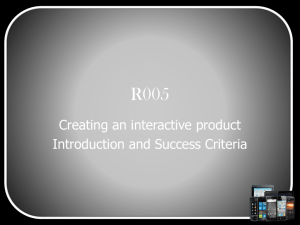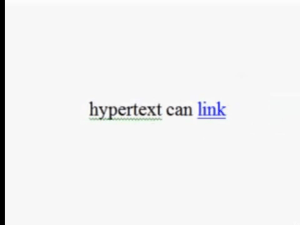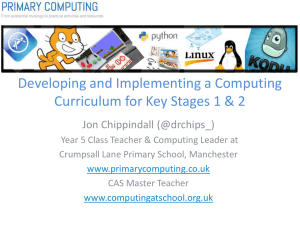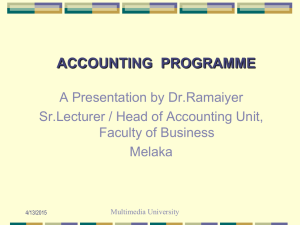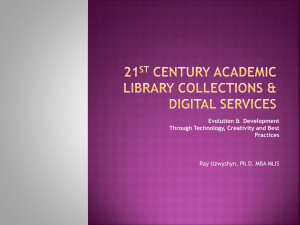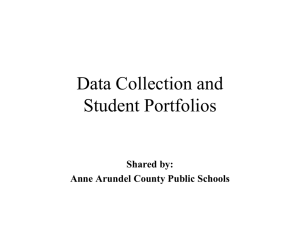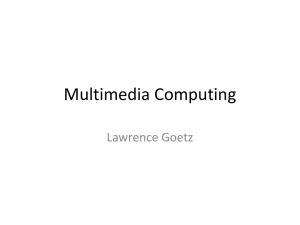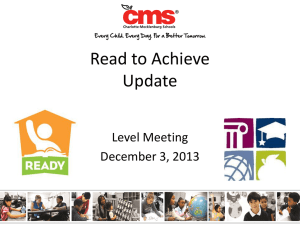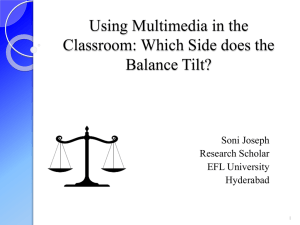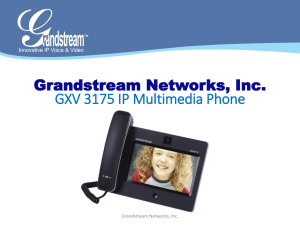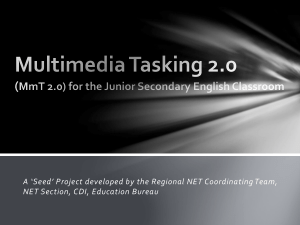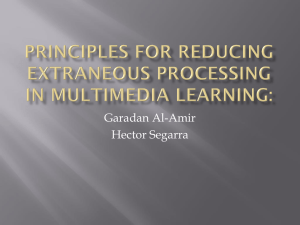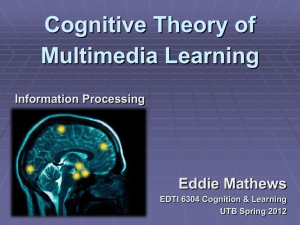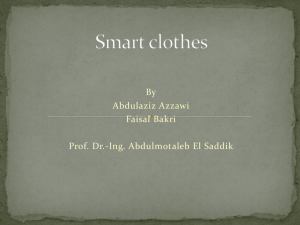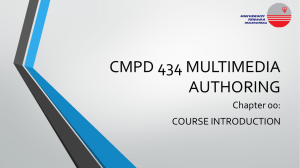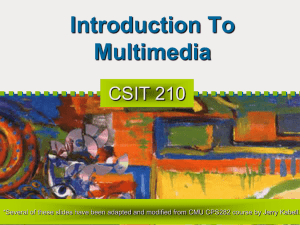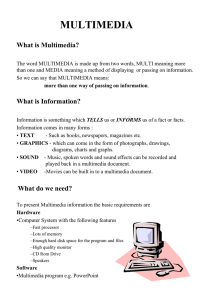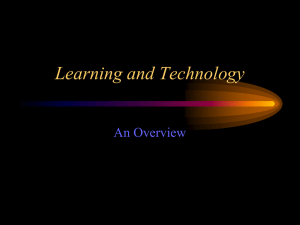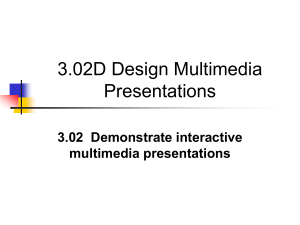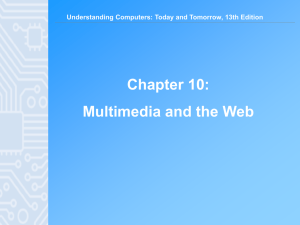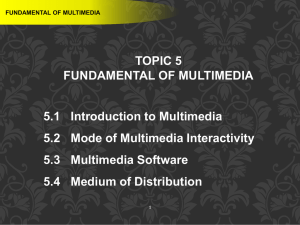Springston
advertisement
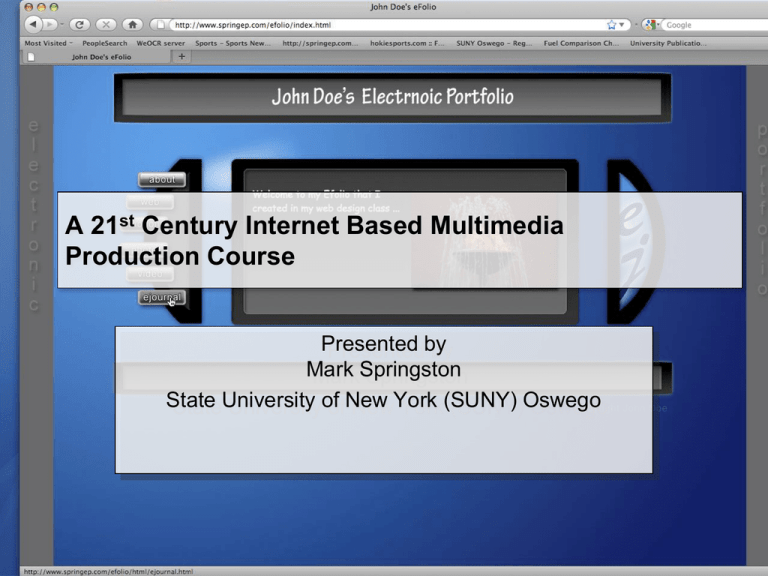
A 21st Century Internet Based Multimedia Production Course Presented by Mark Springston State University of New York (SUNY) Oswego A 21st Century Internet Based Multimedia Production Course • Focuses on strategies for teaching students to create and publish multimedia to the Internet. Course goals, instructional resources, and student work examples will be presented. My presentation today will include the following topics: • • • • Two high schools with strong graphic/multimedia production programs. Current and planned curriculum offerings in multimedia production at the SUNY Oswego Department of technology. Strategies I have developed for teaching multimedia design and production with college technology education majors. – Student multimedia portfolios Course content that I think needs to be included more purposefully in the future. There are two high school teachers that have developed media production courses that I think are exemplars in our field. • • • • • Bill Mulvey at Geneva High School, Geneva, NY http://ghscomlab.genevacsd.org/index.html Dave Faux at Hamilton High School, Chandler, Arizona http://davidfaux.com/ http://davidfaux.com/MOVIEs/Graphic%20Design%20Intro%20 mov.mov The School of Education is receiving 23 million dollars to renovate both of their current buildings. – Our department has been working on revising our curriculum so the design of new laboratories delivers the curriculum. In our revised curriculum, there will be 3 courses that directly relate to multimedia design and production. • • • TEL 1XX Computing Technology and Information Systems for Technology Careers (Also meets a SUNY General Education requirement) TEL 3XX Communication and Multimedia Systems (the only required course that we currently offer) TEL 4XX Gaming Simulation Virtualization and Animation (elective; hopefully dual listed as graduate) The course description for: TEL 1XX Computing Technology and Information Systems for Technology Careers • A foundational laboratory-based course for students aspiring to work in fields that require advanced knowledge of computing technology and information systems. Skill development and conceptual understanding are emphasized. Topics include editing graphics, desktop publishing, organizing data, configuring operating systems, preparing technical presentations, posting web pages, and researching/synthesizing information from multiple sources. TEL 3XX Communication and Multimedia Systems • An intermediate course in multimedia design and graphic production with emphasis in creating content for the WWW. The course provides knowledge, skills, and experience in five areas of Communication Systems: Graphic Production; Audio/Video; Optic Systems; Animation Systems; and Multimedia Systems. The spiral curriculum is one designed to help students create organized knowledge structures in a field or area. There are several principles: • • • • • “Reinforcement: Once learned a topic or subject is reinforced if there is continuing exposure to it. A common complaint of teachers is that topics learned by students early in the curriculum are forgotten later. In the spiral curriculum students are continually looking back on subjects previously learned.” (Harden, R. M. & Stamper, N., 1999) Moving from simple to complex, building upon prior knowledge. Integration of content from different courses and disciplines, instead of creating meaningless boundaries. Creating a logical sequence that the student is challenged, but not overwhelmed. Higher level objectives that require an application of knowledge and skills, instead of recalling facts. (Harden, R. M. & Stamper, N., 1999) Some course goals are being written so concepts are revisited in increasing depth in the course sequence. • • • TEL 1XX: Create a basic web page with a consistent menu system by producing, editing, and structuring HTML or similar tags. Knowledge, Practice, Authentic Learning TEL 3XX: Create a web-based portfolio and/or client web site using industrial web authoring software, while considering accessibility issues. Knowledge, Practice, Authentic Learning, Social Justice TEL 4XX: Create a dynamic, web-based or multimedia site that is designed for user tracking, interactivity, and accessibility. Knowledge, Practice, Authentic Learning, Social Justice Teaching Strategies: What will it take to build a knowledge structure in a technical area? • • Syllabus – Ken Bain’s Workshop: What the best college instructors do (show course examples before going over course expectations) – Create an appetite for the feast, before going into how to prepare the meal Expectations help to get to the bigger picture It is important to communicate time and effort expectations. From the course syllabus: • • This is a 300 level course, and the content area being both technical and creative is inherently time consuming. You will get out of the course what you put into it. The average student should expect to work consistently on class related items approximately 3.5 hours per week. If you do not orient yourself to the course, procrastinate on your designs, or do not have basic computer skills in organizing your work, you may require more time. This is not necessarily a negative item, if you put in the necessary time and effort, because you will be bringing your skills up to date. Once again, you will get out of the course what you put into it. Note that students are in class for 5.5 hours per week. Create and organize instructional resources that are sequenced around key concepts. I’ve created four units: • • • • • Design – designing and creating a mockup of the web site using Photoshop. HTML – using a simple text editor to make a site that includes media. Produce – using Dreamweaver to produce a functional portfolio web site based on the Photoshop mock-up made in the design unit Motion – using Flash to make simple motion graphics and a navigation system See interface of how they are organized Focus on groupings and seeing tools and concepts in varied contexts. Exercises help prepare students for the assignment, and can take different formats. • • • • • • Exercises (easy access to start and finish files) Some individual Some collaborative Some teacher demonstrated Some tutorial based Some discussion based Assignments allow students to extend/apply what they learned in the exercises • • • Balance team and individual work Include requirements that help student encounter the key concepts, principles, skills and attitudes See the assignment sheet Critique and have access to past student work (composite, photos, eFolios, videos) • • • • • Critique and have access to past student work (composite, photos, eFolios, videos). Use web hosting services or other avenue (e.g., school intranet) to display student work. After this semester, I will have over 200 student portfolios on-line with a web hosting subscription. Always keep a back-up of student work locally. Let’s take a look at a few portfolios. – – – – http://www.springep.com/tedfolio09/brand http://www.springep.com/tedfolio09/gleason http://www.springep.com/tedfolio09/ranalletti http://www.springep.com/tedfolio09/fromm In the Communication Systems course the web-based portfolio is the integrative project. See examples. • • “Growth and learning progress portfolios, like other assessments, work best when integrated fully into your teaching. Some writers advocate making the portfolio the center of you instructional planning and teaching activities so you and your students will interact intensively with the portfolio contents. This is called the portfolio culture model of conceptual change” (Nitko & Brookhart, 2007 citing Duschl & Gitomer, 1991). From Communication Systems (TEL 363) syllabus: For most of your work in this class, you will display it in a web-based portfolio. The portfolio should look and function well, and describe the tools, materials, techniques, principles, and processes you used to create each assignment. The purpose of the web-based portfolio is to develop and demonstrate your web working skills, and by describing the process you went through to create your work, reinforce and further your learning. I show students some of my work. I try to model how I considered different design factors and trade-offs. • • HD touching lives: http://www.springep.com/HDpublished3/ TECA East site: http://www.tecaeast08.com/ In one case, I had students develop some course content through a video assignmet. Customize your course resources/course atmosphere for student success • • Comm Lab Computer Set-up (shortcuts) – Shortcut menu states what the software is for: Flash for creating motion graphics – Can make a lab workspace for each Creative Suite Product • Can highlight items or even remove items from a menu for younger students (look at in Photoshop) Course web site embedded in a course management system Conceptual/instructional videos to enhance some content. Better if you can place on reserve in the library or on-line. Math skills are important in multimedia design and production. • • Geometry – For example working in a 3 D-space – Show the example in Flash Algebra for creating functions and variables – Calculating needed resolution – Show simple ActionScript Some scripting ability is important in advanced multimedia design and production. • • Custom Scripting (show button instance example and random star example) Object oriented programming Understanding key concepts is important. Some selected examples are: • • • • Resolution for different purposes Designing for multiple output devices and accessibility issues Styles and their emphasis in different software. What are the 2 main reasons to use styles? Workflow and productivity tools It is important to focus on key skills, and not let too many step-by-step instructions block more general understandings. Below are selected examples: • • • Knowing the different tools and how to use them effectively – Selecting the right tool For example, using Photoshop to resize images for different devices or print – Not driving up file size when bandwidth is an issue – What is sufficient ppi for a print – Why doesn’t ppi equal dpi Creating designs based on a percent of the device The following are my conclusions. • • • • • Every classroom situation is different, so each teacher must develop strategies for meaningfully allowing students to engage the content. Organizing course resources so that students are exposed to the content so it helps to build a knowledge structure. Multimedia creation can provide students with a meaningful experience going through the design process and technical production. Custom (not pre-designed templates) made electronic portfolios have the ability to teach many skills and concepts related to multimedia design and production. Discussion and questions References • • • Duschl, R. A. & Gitomer, D. H. (1991). Epistemological perspectives on conceptual change: Implications for educational practice. Journal of Research in Science Teaching, 28, 839-858. Harden, R. M. & Stamper, N. (1999). What is a spiral curriculum? Medical Teacher, 21(2), 141-143. Nitko, A. J. & Brookhart, S. M. (2007). Educational assessment of students (5th ed.). Upper Saddle River, NJ: Person Education.
